


The best of the first season with the original cast, where the programme is still finding its feet and is often hamstrung by the regulars. Nicholas Young as John, while something of an old-fashioned character, is a reliable presence in the series, and Peter Vaughan-Clarke as Stephen, amateurish here, did improve. Yet while Sammie Winmill and Stephen Salmon seem out of their depth as the other Tomorrow People, there is something that's likeable about Salmon's inept reading of Kenny. Vaughan-Clarke, in the worthwhile documentary Beyond Tomorrow, affectionately noted about Salmon that "They thought I couldn't act... I shone, I was Tom Cruise compared to him."
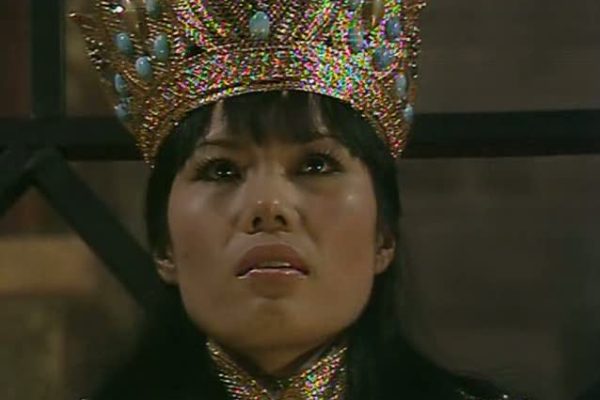
With studio damage to the original, impressive set of TIM, we now get the character recreated as a mobile teasmaid, and things were never really quite the same. A better addition is Misako Koba as a new Tomorrow Person to cover for Elizabeth's real-life pregnancy. A Japanese actress playing the role of Hsui Tai, it must be acknowledged that her heavy accent is a little impenetrable... however, for a lead cast member then she's well above standard, and gives a good performance in a story full of nice lines and a decent guest cast... a little charmer, in fact.
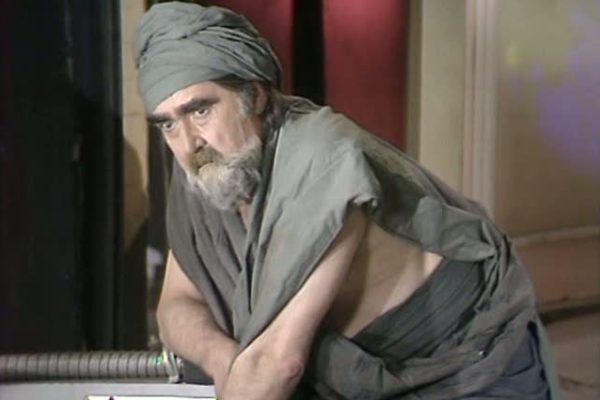
Roger Price got bored of his creation fairly quickly, and wanted to use this story to kill off the cast. Unfortunately, the series was so successful that ITV insisted he revise the ending and continue the series. While season three certainly has its missteps, including the worst story of them all, it was the last to see the series hang on to a consistent integrity. That's not to say that what followed in the final five seasons was beyond redemption - indeed, one of those stories features in the top five here - but after this point the quality control is all over the place.
The Tomorrow People is an easy target for detractors on clips programmes, and any retro TV shows that bring it up focus on one of the cast members being in a band, or the sillier special effects. Seasons 1-3 (or, in fairness, seasons 1-5) would never have stooped so low as to introduce anything as ludicrous as the alien Sorsons. As for The Revenge of Jedikiah, then it's pulpy, but a fun one for fans, mixing in characters and events from previous stories, along with the antagonist from the first two serials. The ending, like a lot of the endings to the series, is weak and contived, but it gets by on a low-key, doomed air.
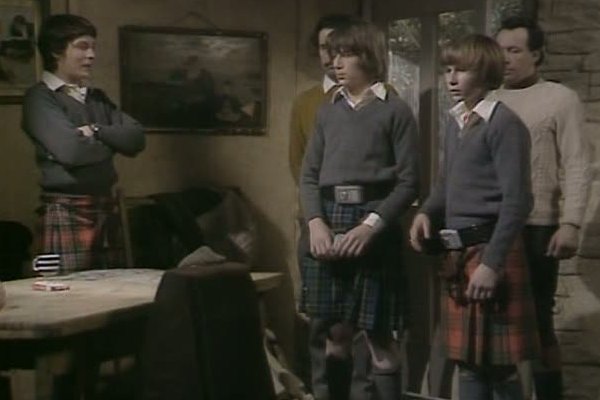
Stephen goes undercover at a Scottish boarding school, where military enthusiasts are plotting to disrupt peace talks. An odd standout in a largely serious story is Nigel Pegram as a comedy traffic warden (he reappears in The Blue and the Green)... however, such additions don't undermine the artifice like they do in One Law, and they are, to an extent, a necessary pause from a relatively heavy-going storyline for kid's TV.
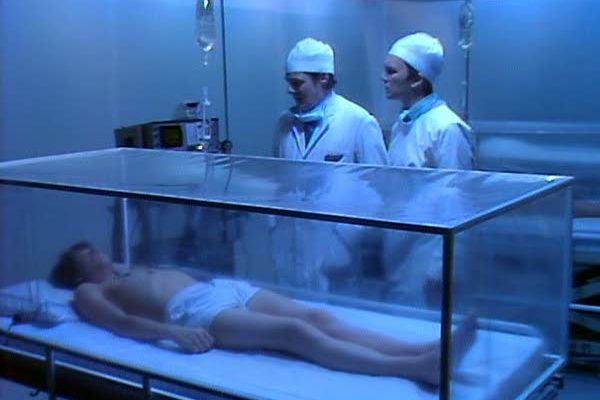
"You could be here one minute... and, say, in The Kremlin the next."
"Yes, I could, but I can think of no reason to go there."
"Oh, I can think of a million reasons to go there."
Considering how the series ended in a silly puppet show, it's so refreshing to see it not playing down to the worst limitations of its genre, but here really living up to the potential of its format. When government agencies discover the Tomorrow People, two of them are kidnapped and kept alive only by life support systems. While the resolution is pat and the pacifist message heavy-handed, this is the series exploring a darker, more adult take on its own format.
This opening story to the third season also brings in 13-year-old Dean Lawrence as new cast member, gypsy boy Tyso Boswell. Lawrence is given little to do after this debut story (or even during it), but one thing that can't be stated enough is how progressive the series could be for its time. Although the gypsy families presented are not without stereotyping in their love of junk, curses and money, they are, Tyso particularly, presented as positive characters. Well, maybe not the dad who scars his son with a beating and then sells him to the government, but this is one of the few series on television, even today, that has a gypsy as a likeable hero for a lead. In all, a strong story that for once doesn't talk down to its audience or sell itself short.
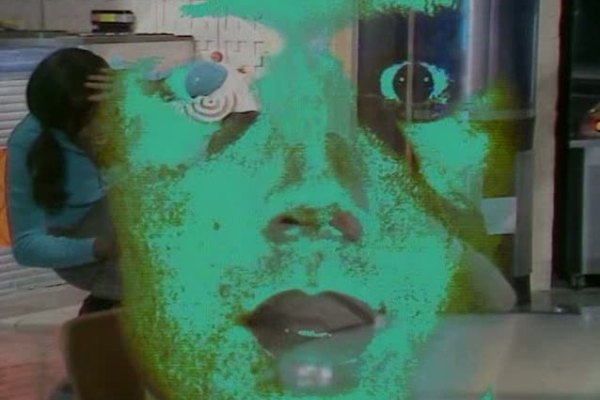
The opening of the second series, which sees the programme really begin to take itself seriously. Gone are comedy bikers and, eventually, endings where everyone laughs at nothing in particular, and in comes more layered characterisation and social commentary. The idea of racial and religious tensions being metaphorically represented as different-coloured badges is kind of trite and heavy-handed ("Well look at Northern Ireland!"/"There are enough colour problems in the world already without introducing blues and greens into the spectrum of hatred" are two ham-fisted entries into the dialogue), but suitably well-meaning. Roger Price was very much the anti-establishment pacifist, and injected his scripts with some subtle (and often not-so-subtle) messages on peaceful co-existence. Predating Grange Hill by four years, this is a school-based story featuring mind control turning kids to violence. Fighting in The Tomorrow People is never realistic, and all of the "fights" here are appallingly mimed, with some of the kids even laughing onscreen.
Yet with the violence effecting the entire country in random pockets and genuine riot footage mixed in, you can think back to the recent UK riots of 2011 and see that the series can still be relevant today. Often it's not about how effective the end result was, but the openly displayed potential. There's a feeling that this story is an episode too long as a five-parter, and it does pad the runtime out with silly asides, such as the aforementioned Nigel Pegram as a comedy shopkeeper. But innovative for the time is Elizabeth Adare as a new Tomorrow Person, making this the best line-up the series ever had... Nicholas Young as John is a safe pair of hands and Vaughan-Clarke has really settled down and improved as Stephen. Yet despite the progressive nature of Adare's character, it wasn't all that easy back in the 1970s... the actress was required to wear a wig until her final story, giving her straight hair.
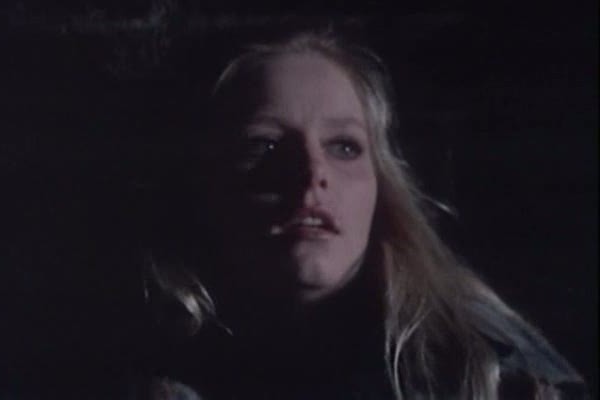
From this point on, all the stories of The Tomorrow People (save for The War of the Empires) became shorter, two-part tales. It doesn't really sharpen up The Dirtiest Business, which is blighted by staginess and large clumps of exposition, but is more overtly adult than any other story. Here there's no Galactic Federations or black hole singularities... it's Mike in an alleyway having a knife held to his throat... John falling over alcoholic tramps... or Liz being asked if she's a heroin addict or interested in going into prostitution. With extensive location filming (except for the aforementioned alleyways, distractingly created in studios, but they tried) this is a series still daring to take itself seriously.
There's no given explanation for why the Russian Tomorrow Person Pavla (Anulka Dziubinska) speaks with a cut-glass English accent, though another anomaly is that the actress was really 26, and not the 16-year-old she plays in the show... a piece of trivia that will doubtless relieve anyone who chooses to google several NSFW images of her on the net. The KGB agents in the story are slightly derogatory in their presentation, but then this is a serial that doesn't pull punches with its depiction of the UK secret service, either. The conclusion may cause a split in critical appreciation: on one level, the dummy used is Benny Hillesque, and Mike Holoway's acting clearly isn't up to the job required; yet on the other it's the bleakest, most cynical ending they ever ran.